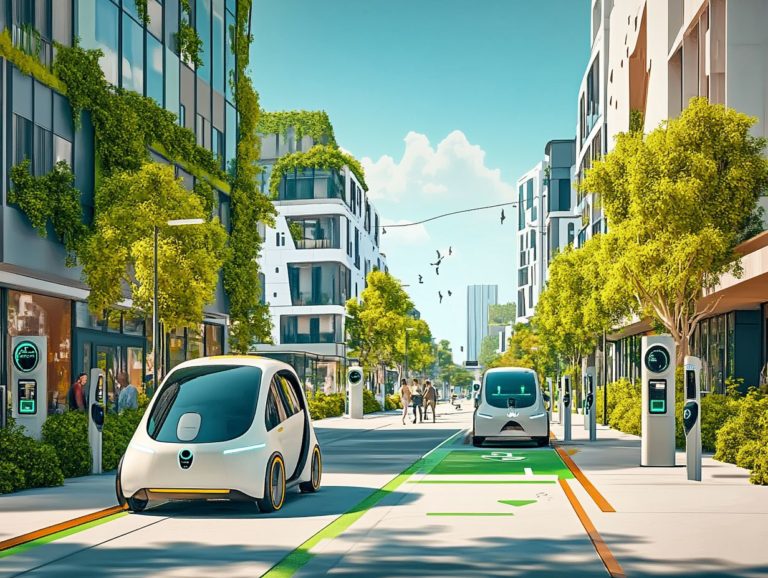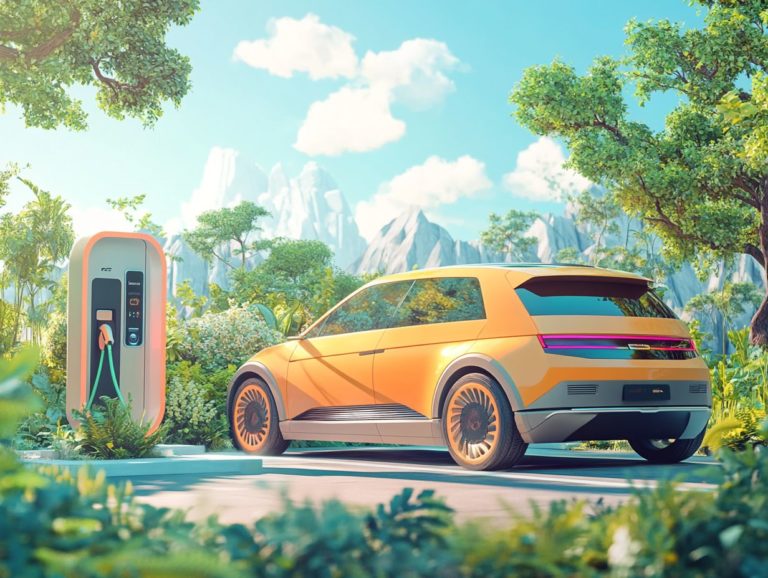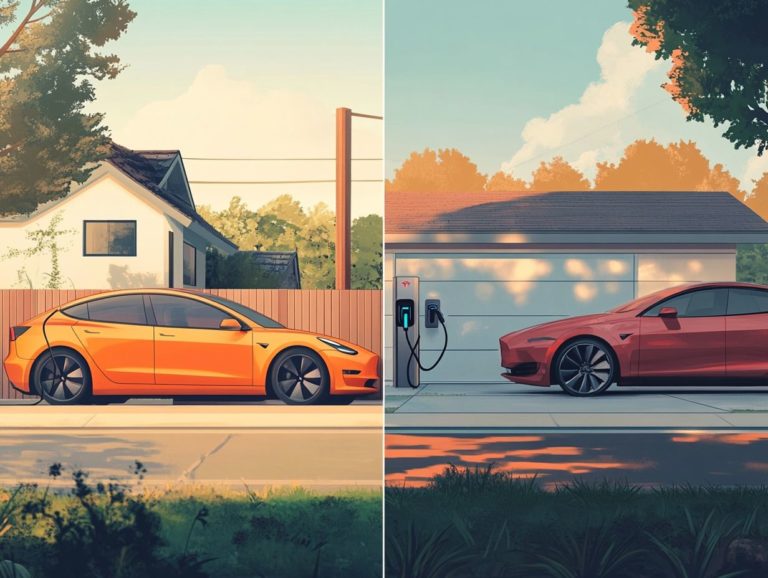The Top 10 Electric Vehicle Innovations of 2024
As electric vehicles (EVs) continue to reshape the automotive landscape, 2024 is poised to unveil groundbreaking innovations that will enhance your experience in performance, convenience, and sustainability.
From revolutionary wireless charging technology to the integration of advanced systems, these advancements are designed to redefine your relationship with transportation.
Get ready to explore the top 10 innovations that are changing the EV game, examining their environmental benefits, potential drawbacks, and how they will influence your consumer behavior in the years to come.
Prepare to discover how these developments can steer you toward a more sustainable future.
Contents
- Key Takeaways:
- 1. Wireless Charging Technology
- 2. Solid-State Battery Technology
- 3. Vehicle-to-Grid Technology
- 4. Autonomous Driving Capabilities
- 5. Advanced Driver Assistance Systems
- 6. Improved Range and Battery Life
- 7. Enhanced Charging Infrastructure
- 8. Lightweight and Sustainable Materials
- 9. Augmented Reality Displays
- 10. How AI is Revolutionizing Your Driving Experience
- How Will These Innovations Change the Electric Vehicle Industry?
- Frequently Asked Questions
- Discover the Top Electric Vehicle Innovations of 2024!
- How Will Electric Vehicle Innovations Impact the Automotive Industry in 2024?
- Are There Any New Electric Vehicle Brands Expected to Emerge in 2024?
- Will There Be Advancements in Charging Infrastructure for Electric Vehicles in 2024?
- How Will Electric Vehicle Innovations Impact the Environment in 2024?
- Are There Any Concerns About the Safety of Electric Vehicles with These New Innovations?
Key Takeaways:
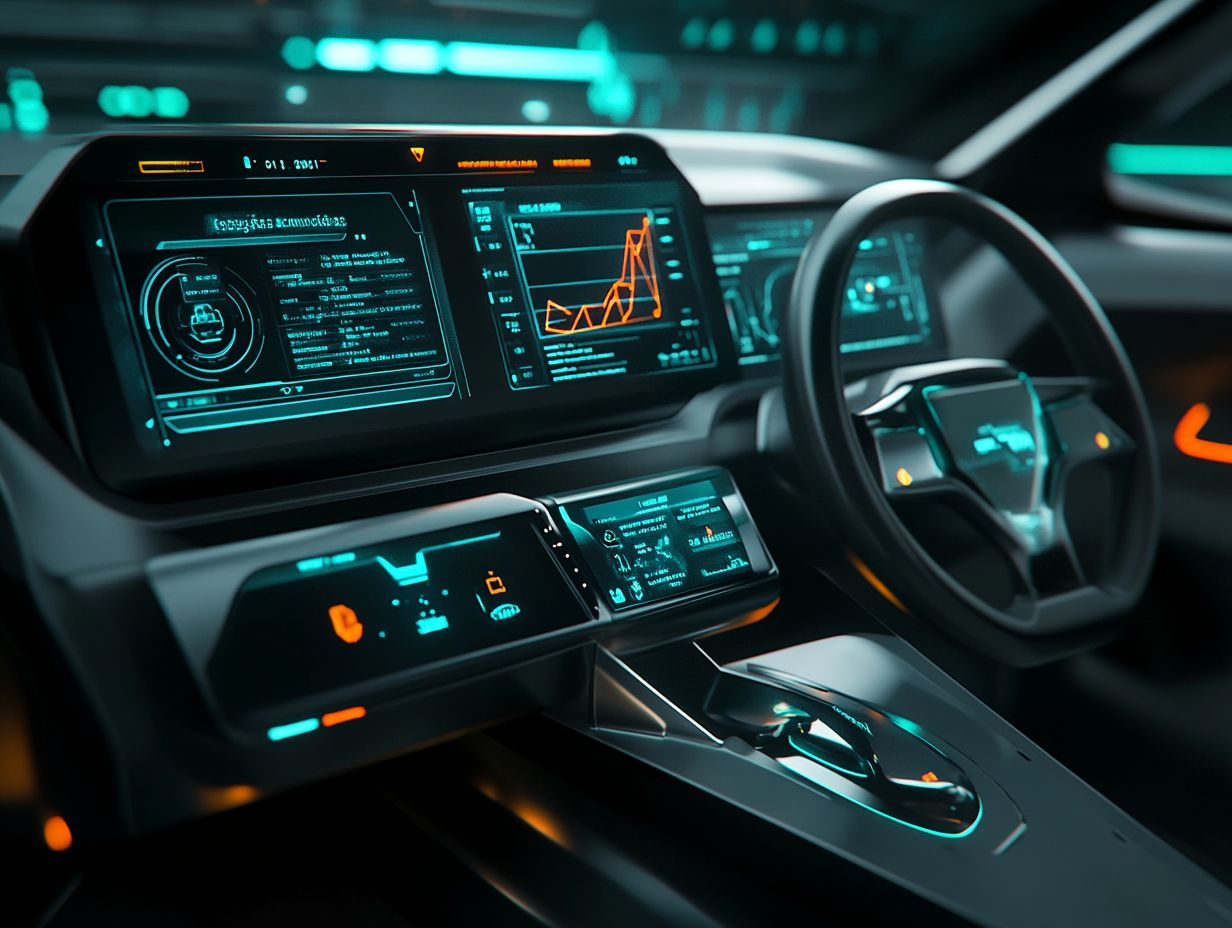
- Wireless charging technology will revolutionize the way electric vehicles are powered, providing convenience and eliminating the need for cords and plugs.
- Solid-state battery technology will greatly improve the performance and safety of electric vehicles, making them a more attractive option for consumers.
- The integration of artificial intelligence and advanced driver assistance systems will enhance the driving experience and improve safety on the road.
1. Wireless Charging Technology
Wireless charging technology is transforming how you power electric vehicles (EVs), like the Tesla Cybertruck, by eliminating traditional charging methods and creating a seamless experience for drivers as you move into 2024 and beyond.
This innovative approach offers you remarkable convenience, allowing you to simply park over a charging pad to recharge your vehicle no more fumbling with cables and plugs.
Wireless charging also enhances efficiency, ensuring energy transfer occurs at optimal rates. It easily integrates with various vehicle models, making the charging process smoother across different brands.
As this technology evolves, it promises to reshape current charging stations, complementing traditional ones and alleviating pressure on power grids. Such advancements could inspire broader adoption of EVs, paving the way for a smarter, more accessible transportation future tailored for you.
2. Solid-State Battery Technology
Solid-state battery technology signifies a remarkable leap in energy storage, promising to significantly enhance the performance and range of electric vehicles like those from Tesla and BYD.
With improved energy density and safety features, this advancement is set to change how you drive.
These innovative batteries use a solid electrolyte rather than the liquid or gel electrolytes found in traditional lithium-ion batteries, effectively reducing risks such as leakage and flammability.
The materials involved typically include lithium metal anodes paired with ceramic or polymer electrolytes, delivering greater ionic conductivity and allowing for faster charging times.
Manufacturers like Tesla and BYD are making substantial investments in this technology, keen to harness its potential for longer battery life and enhanced efficiency. This is crucial not only for your satisfaction as a consumer but also for the broader acceptance and adoption of electric vehicles in the automotive landscape.
3. Vehicle-to-Grid Technology
Vehicle-to-Grid (V2G) technology presents you with a groundbreaking method of energy management, enabling electric vehicles think Tesla models not only to draw power from the grid but also to return energy during peak demand. This dual capability significantly enhances both EV performance and grid stability.
Imagine this innovative system leveraging the battery storage capacity of your electric vehicle to supply energy back to the grid precisely when it s needed most, particularly during those high-demand periods.
This approach not only boosts energy efficiency but also opens the door to substantial cost savings for you. By participating in energy trading programs, you can financially benefit from your vehicle’s contribution.
Manufacturers such as Nissan and BMW are already rolling out V2G solutions, paving the way for consumer adoption of this transformative technology.
With the rise of autonomous driving, you re looking at an exciting opportunity to optimize energy usage even further. Self-driving vehicles will be able to intelligently determine the most opportune moments to charge or discharge energy, all based on real-time grid demands and traffic patterns.
4. Autonomous Driving Capabilities
The evolution of autonomous driving capabilities is reshaping the automotive landscape, and you ll find brands like Tesla leading the charge. Meanwhile, emerging Chinese brands such as BYD are also making significant strides in this cutting-edge technology, promising safer and more efficient transportation.
As these advancements unfold, you may notice that Tesla’s Autopilot features are often praised for their sophisticated user interface and seamless integration with electric vehicles. Concurrently, Chinese manufacturers are rapidly innovating, rolling out competitive systems designed to enhance your overall driving experience.
However, this race toward autonomy comes with its challenges. Regulatory hurdles loom large, as governments work to develop frameworks that prioritize safety without stifling innovation.
Public perception plays a critical role, with many consumers expressing concerns, including you, about the reliability of these technologies.
Ultimately, the balance between safety, regulatory compliance, and consumer trust will lead the way in determining which brands rise to the forefront of this transformation.
5. Advanced Driver Assistance Systems
Advanced Driver Assistance Systems (ADAS), which help prevent accidents by assisting drivers with tasks like staying in their lane, are crucial in improving the safety and performance of electric cars. Tesla’s innovations set the standard for technology that enables you to navigate complex driving situations while enhancing overall road safety.
These systems come equipped with features like lane-keeping assistance, which ensures you stay snugly within your lane, and adaptive cruise control, automatically adjusting your speed to maintain a safe distance from the vehicle in front of you.
When you compare Tesla’s offerings to those from competitors like Hyundai and Kia, you’ll notice a distinct difference in user experience and reliability. Many users praise Tesla’s systems for being responsive and cutting-edge, while Hyundai and Kia present strong alternatives that prioritize enhancing your confidence behind the wheel through intuitive designs and solid safety protocols.
This creates a safer driving environment for everyone on the road.
6. Improved Range and Battery Life
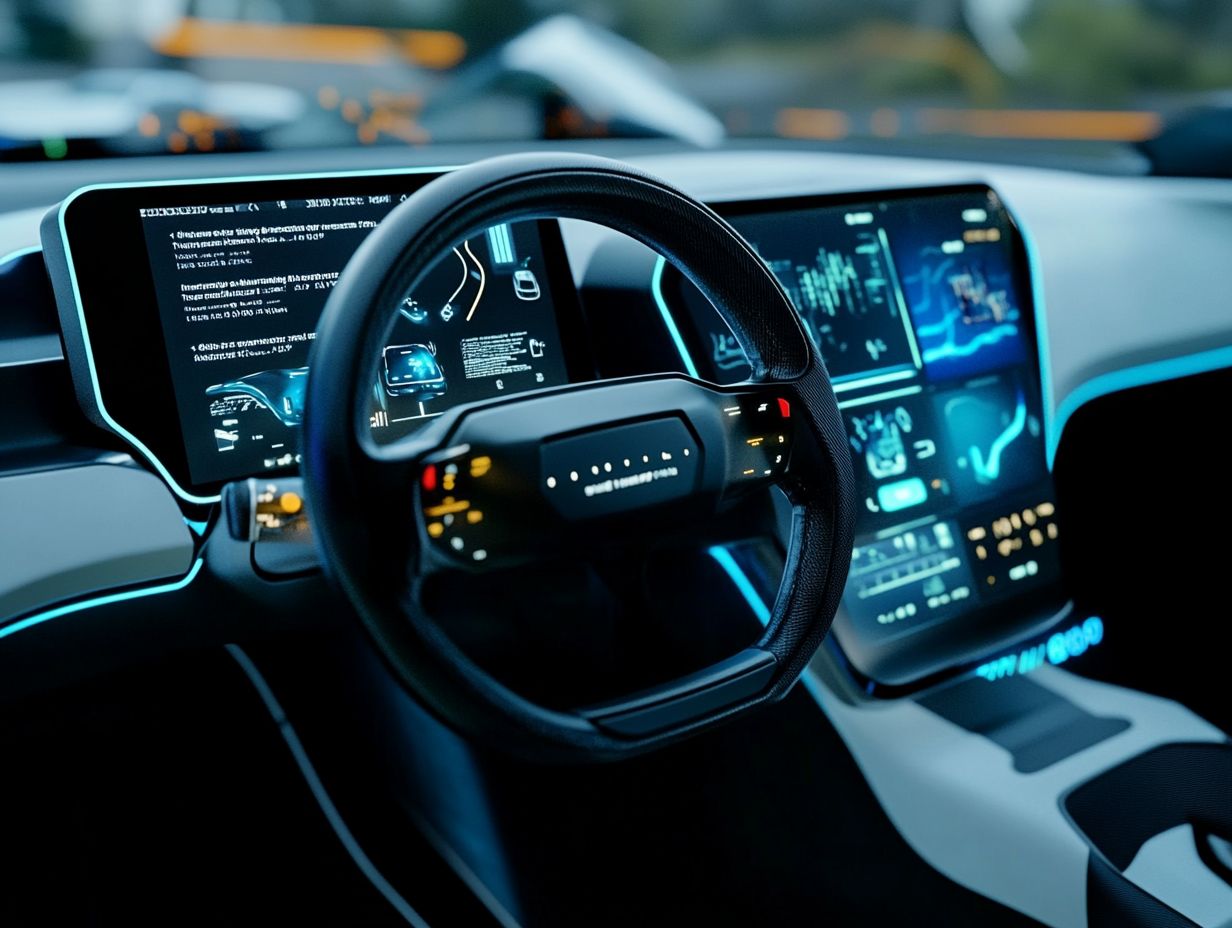
Improvements in battery technology play a crucial role in enhancing the range and longevity of electric vehicles. Manufacturers like Tesla are at the forefront of this innovation, tirelessly working to provide you with the reassurance of extended journeys, all without the anxiety of running out of charge.
This commitment to advancement shines through in Tesla s latest battery design, which combines higher energy density with superior thermal management. This means you can enjoy longer trips on a single charge. Competing brands, such as Hyundai and Kia with their Ioniq series, are also making considerable progress, utilizing similar strategies to elevate their electric offerings.
Take the Ioniq 5, for example; it boasts impressive fast-charging capabilities and substantial battery life, instilling confidence in your vehicle’s performance. The race to enhance EV battery technology is genuinely transforming the landscape, as these innovations collectively make electric driving more accessible and convenient for you.
7. Enhanced Charging Infrastructure
A robust and enhanced charging infrastructure is essential for your seamless transition to electric vehicles. Top brands like Tesla, Hyundai, and Volkswagen are investing heavily in charging stations to ensure you have accessibility and convenience at your fingertips.
As more people switch to electric, the need for charging spots is now more important than ever. A comprehensive network of fast-charging stations is becoming increasingly necessary, allowing you to recharge your vehicle quickly and efficiently. These fast-charging capabilities not only minimize downtime but also ease range anxiety, the fear of running out of battery while driving, a common concern for many potential EV owners.
As car manufacturers unite in this effort, partnerships like those between Tesla and Volkswagen are proving to be invaluable. These collaborations allow for the sharing of resources and technology, ultimately creating a more interconnected charging landscape that benefits you and all EV drivers.
8. Lightweight and Sustainable Materials
The shift toward lightweight and sustainable materials in electric vehicle design is a pivotal move that enhances performance while contributing to a greener future. This allows you, as a manufacturer, to create efficient vehicles that resonate with environmental consciousness.
Innovative brands like Tesla, Hyundai, and Kia are setting the standard by incorporating new types of materials that combine different substances for better performance and aluminum into their designs. These materials reduce overall weight, boosting energy efficiency and enabling your EVs to cover longer distances on a single charge.
For instance, Tesla’s use of aluminum not only slashes weight but also enhances structural integrity, beautifully marrying durability with efficiency. Similarly, Hyundai and Kia are making strides with lightweight plastics and high-strength steel in their EV models. This leads to improved acceleration and handling while minimizing energy consumption.
This focus on material innovation directly impacts performance and reflects a broader commitment to sustainability and excellence in the electric vehicle industry.
9. Augmented Reality Displays
Augmented reality displays are revolutionizing the electric vehicle landscape, offering you real-time information and enhancing your driving experience with intuitive interfaces that seamlessly integrate advanced navigation and safety systems.
This cutting-edge technology enables you to visualize critical data like directions and speed right on your windshield. This effectively minimizes distractions and promotes safer driving habits. Brands such as Tesla are leading the charge, pioneering features that boost vehicle functionality and create an engaging user experience.
By overlaying essential alerts, such as potential hazards or obstacles, augmented reality helps you make informed decisions while on the road. These applications also extend to your vehicle’s infotainment systems, delivering immersive entertainment options and ultimately elevating your overall driving experience.
10. How AI is Revolutionizing Your Driving Experience
The integration of artificial intelligence in electric vehicles is transforming your driving experience into something truly exceptional. With capabilities that enhance autonomous driving, improve user interaction, and optimize vehicle performance in real-time, AI sets a new standard for smart travel.
This vital technology supports navigation systems that sift through vast amounts of data to provide you with accurate routes and personalized suggestions tailored to traffic patterns and your unique driving preferences. Imagine a vehicle that can predict maintenance needs, alerting you to potential issues before they escalate, thus boosting your safety and minimizing downtime.
Companies like Tesla are at the forefront of these advancements, employing sophisticated AI algorithms sets of rules that computers follow to solve problems to refine their Autopilot feature. This ultimately makes your driving journey safer and more efficient. As these systems continually learn from your behavior and road conditions, the future of driving promises to be not only easier but significantly more enjoyable.
How Will These Innovations Change the Electric Vehicle Industry?
The rapid rise of technological innovations in electric vehicles think Tesla’s strides in autonomous driving and Hyundai’s commitment to sustainable materials is poised to fundamentally transform the automotive industry. This shift will reshape your expectations as a consumer and enhance your overall driving experience.
As you prioritize sustainability and cutting-edge technology, manufacturers will need to innovate continuously to keep your interest. The proliferation of AI will streamline manufacturing processes and boost vehicle functionalities, making electric cars increasingly appealing to you.
With a robust charging infrastructure on the rise, range anxiety will soon be a thing of the past, encouraging you and many others to embrace EVs. This evolving market landscape is likely to spark fierce competition among automotive giants, driving down costs and making electric vehicles more accessible for everyone.
The collective environmental impact of these changes promises a cleaner, greener future, ultimately influencing policy and shaping consumer behavior in profound ways. Don t miss out on the future explore your options for electric vehicles today!
What Are the Environmental Benefits of Electric Vehicles?
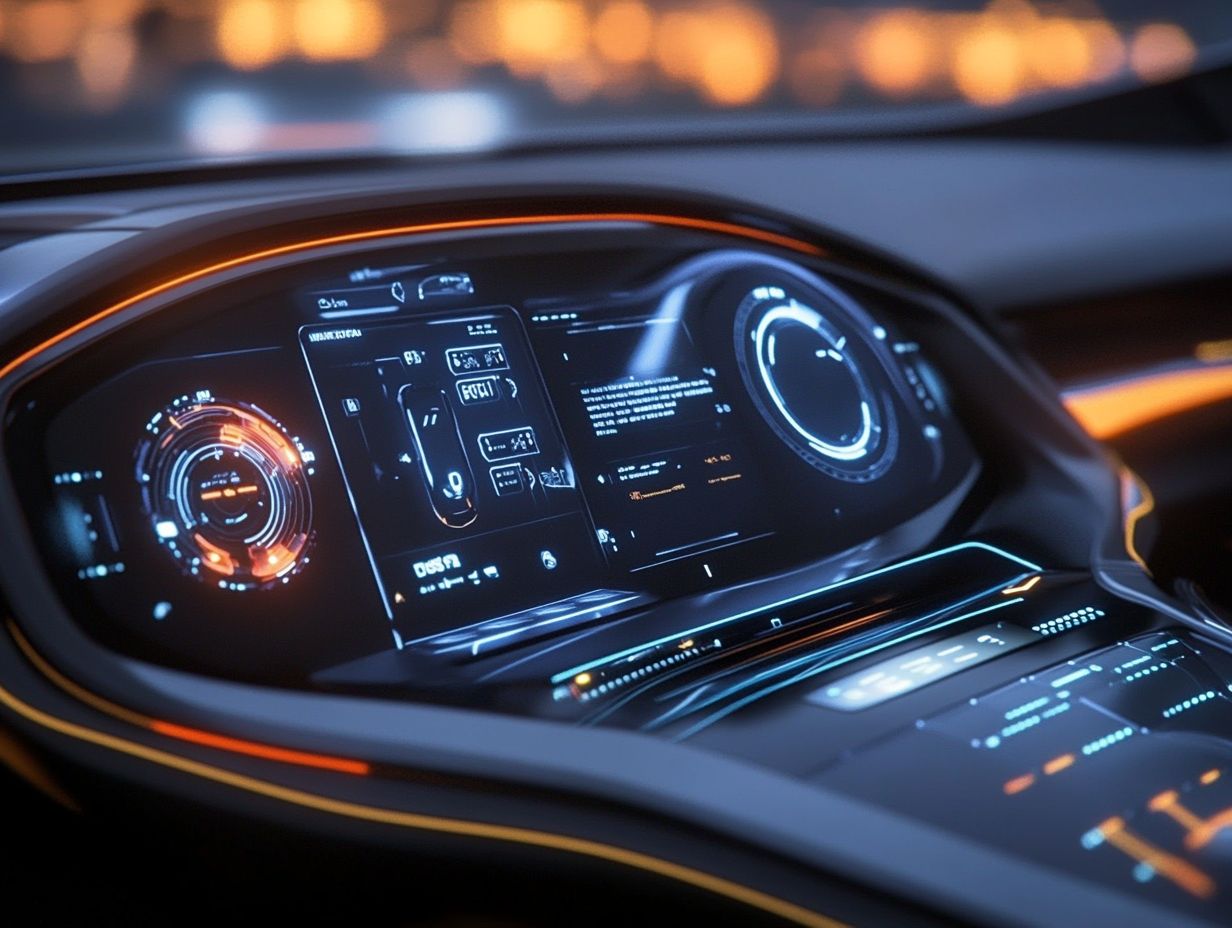
Electric vehicles present substantial environmental advantages, such as reduced greenhouse gas emissions and enhanced air quality. These benefits arise from advancements in charging technology and the shift toward sustainable energy sources.
By replacing traditional combustion engines known for spewing carbon dioxide and other pollutants these modern alternatives significantly cut harmful emissions.
It’s exciting to see how incorporating renewable energy sources to power EVs amplifies their positive impact on the planet.
In areas where air quality is compromised, this transition is particularly beneficial. Electric vehicles produce zero tailpipe emissions, leading to cleaner streets and healthier communities.
Embracing EVs is a pivotal step toward fostering a more sustainable future, ultimately helping to mitigate the long-term effects of climate change.
What Are the Potential Drawbacks of These Innovations?
While advancements in electric vehicle technology promise many benefits, it’s important to consider potential drawbacks, such as issues related to battery production, resource scarcity, and the overall performance of emerging systems.
Manufacturers face significant hurdles in their shift to solid-state batteries, which are new, safer types of batteries that can store more energy. They hold promise for higher energy density and enhanced safety, but they rely on rare materials that might soon be tough to source.
For consumers, navigating these evolving technologies can feel overwhelming, especially when different manufacturers promote various standards and features.
The complexities of autonomous driving systems introduce both technical challenges and ethical dilemmas. Questions about safety, liability, and the readiness of regulatory frameworks pose additional concerns. These factors create a challenging landscape for manufacturers eager to innovate while consumers seek reliable and sustainable vehicles.
How Will These Innovations Impact Consumer Behavior?
The emergence of innovative technologies in electric vehicles is set to significantly shape consumer behavior. Features like autonomous driving and advanced charging capabilities, as outlined in what to expect from new car features in 2024, will be crucial elements in decision-making when considering an EV.
As consumers become more informed, their expectations will evolve. They will likely seek brands that not only offer state-of-the-art technology but also emphasize sustainability and an enhanced user experience.
Tesla s reputation for pushing the boundaries of innovation is particularly appealing to forward-thinking buyers who value performance and a lifestyle rooted in eco-friendliness. Meanwhile, Hyundai is making its mark by delivering affordability alongside impressive tech features, resonating with practical consumers.
This duality in approach indicates a shift toward brands that cater to both performance and cost-effectiveness. As they navigate choices, it’s clear that advanced capabilities and ethical considerations are becoming increasingly important.
What Are the Predictions for the Future of Electric Vehicles?
As the electric vehicle market evolves, predictions point toward a significant uptick in adoption rates. This surge is largely fueled by technological advancements from industry leaders like Tesla and emerging Chinese brands, alongside improvements in charging infrastructure.
The global shift toward sustainability is prompting governments to implement stricter emissions regulations and offer generous incentives for electric vehicle buyers. As consumers become more environmentally conscious, the demand for greener alternatives rises, presenting a unique opportunity for manufacturers to innovate.
Enhanced battery technologies are on the horizon, promising longer ranges and shorter charging times, boosting consumer confidence. As economies of scale take effect, the production costs of electric vehicles are expected to decline, making them more accessible to a wider audience.
This transformation is set to reshape the automotive landscape in thrilling ways. Are you ready to embrace the electric revolution?
How Can These Innovations Help Achieve a More Sustainable Future?
Innovations in electric vehicle technology do more than just enhance performance; they are vital to forging a more sustainable future by promoting energy efficiency and reducing reliance on fossil fuels.
As these advancements happen, you ll notice the integration of advanced charging options and improved battery types that support broader eco-friendly goals and lower carbon footprints.
Fast-charging stations are here to change the game! They significantly cut down recharge times while extending battery life. This not only makes electric vehicles more convenient for your daily routine but also encourages more consumers to switch from traditional vehicles.
With ongoing investment in renewable energy sources to power these charging stations, the synergy between electric vehicle technologies and sustainability initiatives is paving the way toward a greener planet. Switching to electric vehicles is not just a choice; it s vital for our planet s future!
Frequently Asked Questions
Discover the Top Electric Vehicle Innovations of 2024!
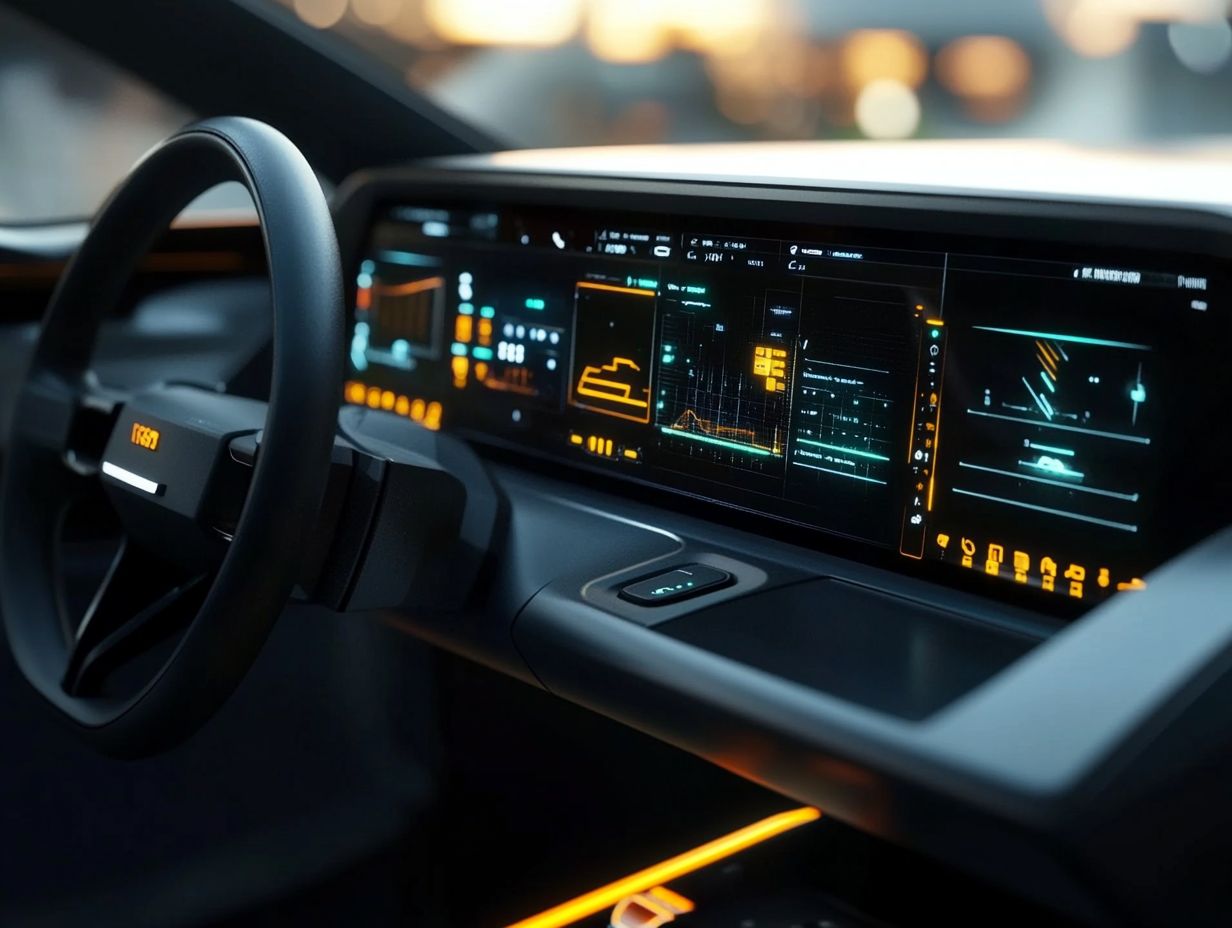
The top 10 electric vehicle innovations of 2024 include:
- Advancements in battery technology
- Wireless charging
- Autonomous driving capabilities
- And more!
How Will Electric Vehicle Innovations Impact the Automotive Industry in 2024?
The advancements in electric vehicle technology in 2024 will significantly impact the automotive industry, and if you’re considering a new vehicle, check out the top 10 new cars of 2024 that promise increased efficiency, improved range, and reduced costs.
Are There Any New Electric Vehicle Brands Expected to Emerge in 2024?
Yes! Several new electric vehicle brands are expected to enter the market in 2024, including startups and established companies expanding into the electric vehicle market.
Will There Be Advancements in Charging Infrastructure for Electric Vehicles in 2024?
Yes, there are advancements in charging infrastructure planned for 2024, including the development of more fast-charging stations and improved technology for wireless charging.
How Will Electric Vehicle Innovations Impact the Environment in 2024?
Electric vehicle innovations in 2024 will positively impact the environment, as they emit zero emissions and reduce reliance on fossil fuels. Additionally, exploring the top 5 luxury cars of 2024 can provide insights into the latest advancements in eco-friendly technology.
Are There Any Concerns About the Safety of Electric Vehicles with These New Innovations?
While safety is always a top priority, advancements in electric vehicle technology are designed to improve safety with features such as advanced driver assistance systems and improved battery management systems.

